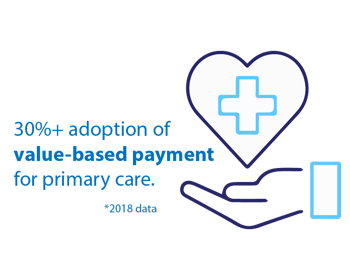The Delaware Center for Health Innovation (DCHI) evolved during the early phases of planning for a state health plan in 2013. The Delaware Health Care Commission convened a multi-sector group of stakeholders to create a statewide health innovation plan. This work culminated in Delaware receiving a multiyear Center for Medicare and Medicaid (CMMI) State Innovation Model grant to drive innovation and change to achieve the Triple Aim across Delaware. Incorporated in 2014 and from its earliest inception, DCHI played an integral role in planning, implementing, and scaling critical components of the State Health Innovation Plan (2013-2018).
The Center catalyzed change to achieve Delaware’s vision for better health, quality of care, lower cost, and better patient and provider experiences. From the start, it was envisioned as the entity to motivate long-term collaboration to ensure on-going extensive stakeholder involvement to achieve systemic transformation. Since the SIM’s conclusion, DCHI has remained committed to Delaware’s vision for change. DCHI continues to provide a safe forum for robust stakeholder engagement, exchange, and collaboration in moving Delaware toward lasting health care transformation and value-based care.
The Delaware Center for Health Innovation seeks to align interest, resources, and momentum among public and private sectors to cause sustainable change and impact. DCHI regularly convenes invested partners and stakeholders to advance innovations and best practices that will lead to better quality and health outcomes and lower cost.

.png)




Designed and catalyzed an innovative approach to population health utilizing collective impact theory to drive locally-tailored solutions to address SDoH.
Scaled the Program to three communities and facilitated transition of the program and operations to the Healthy Communities Delaware, where it is expanded and includes a sustainability component.
Produced three white papers to guide the design and implementation of HN programs.
Promoted and facilitated collaborative provider involvement to position primary care as the linchpin of our health care system, and to advocate for its support, significantly to invest the furtherance of care coordination, behavioral health integration, and managing population health, and capacity building among primary care providers and practices.
Convened stakeholders and hosted forums to identify challenges and opportunities presented for Delaware’s primary care providers as healthcare reform progresses; to educate, build support, and generate solutions to ensure the sustainability and effectiveness of primary care.
Informed and advanced the design and scaling of a broad, accessible practice transformation program for Delaware’s primary care providers. The program was based on a series of training modules conducted by educators and transformation experts. DCHI encouraged primary care providers’ engagement in practice transformation.
Encouraged and catalyzed early stakeholder interest and exploration of ACO models in DE and the adoption of innovative ACO models for health care transformation and population health management.
Produced three white papers to guide practice transformation, BHI, and care coordination efforts.

Coordinated stakeholder involvement and active participation in monitoring and promoting the development and adoption of Alternative Payment Models (APM) in Delaware. DCHI instituted a robust stakeholders’ workgroup for identifying pathways to advance the adoption of APM in Delaware, supported cost containment priorities, and involved essential stakeholders in informing state-wide cost-containment initiatives.
Developed accessible and impactful actions to help accelerate BHI by identifying barriers and solutions to BHI and facilitating the adoption of collaborative care codes by payers in DE as a step in supporting BHI.
Fueled stakeholder engagement to achieve consensus around four use cases for access to a Health Care Claims Database (HCCD). This effort laid the groundwork for legislation enacted in 2016, enabling the creation of the Delaware HCCD.
Instituted a robust forum for monitoring payment reform trends and innovations, informing critical stakeholders, and identifying opportunities to stimulate the development and adoption of APM in Delaware. Supported cost containment priorities and involved essential stakeholders of decision making about state-wide cost-containment initiatives
Produced two white papers to guide the drive toward adoption of value-based payment models.

Informed and facilitated the creation of a consumers outreach and education campaign and participated in the implementation of the program. The campaign was designed to advise and encourage consumers to be active partners in the move toward health care transformation and active participants in managing their health.
Engaged consumer representatives consistently and productively to gather broad-based patient and consumer input about health care changes, practices, and care models to ensure a patient-centered approach to health care transformation. Lead the adoption of APM and infused consumer participation across all DCHI led initiatives to encourage consumer input and perspective.
Produced a white paper to guide consumer involvement and stakeholders’ inclusion of consumers in health care transformation and practices.

Convened stakeholders to focus on retraining the workforce and developing strategies for building workforce capacity to meet future needs. DCHI’s Workforce and Education supported the curriculum development for workforce learning and re-learning as health care transformation evolved. The University of Delaware incorporated the curriculum into a graduate health professional and education program for workforce training.
Shared recommendations with Delaware’s Division of Professional Regulations to influence changes to expedite and facilitate licensing and credentialing for health care professionals in the state.
Produced three white papers to guide decision making and policy development to advance health professional workforce development